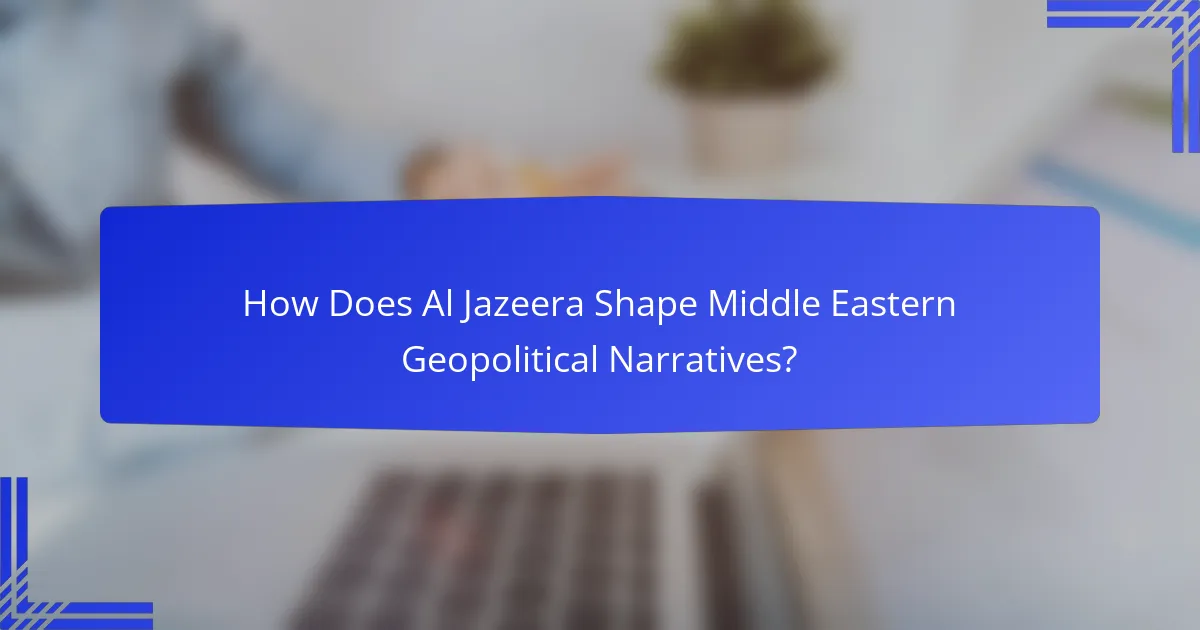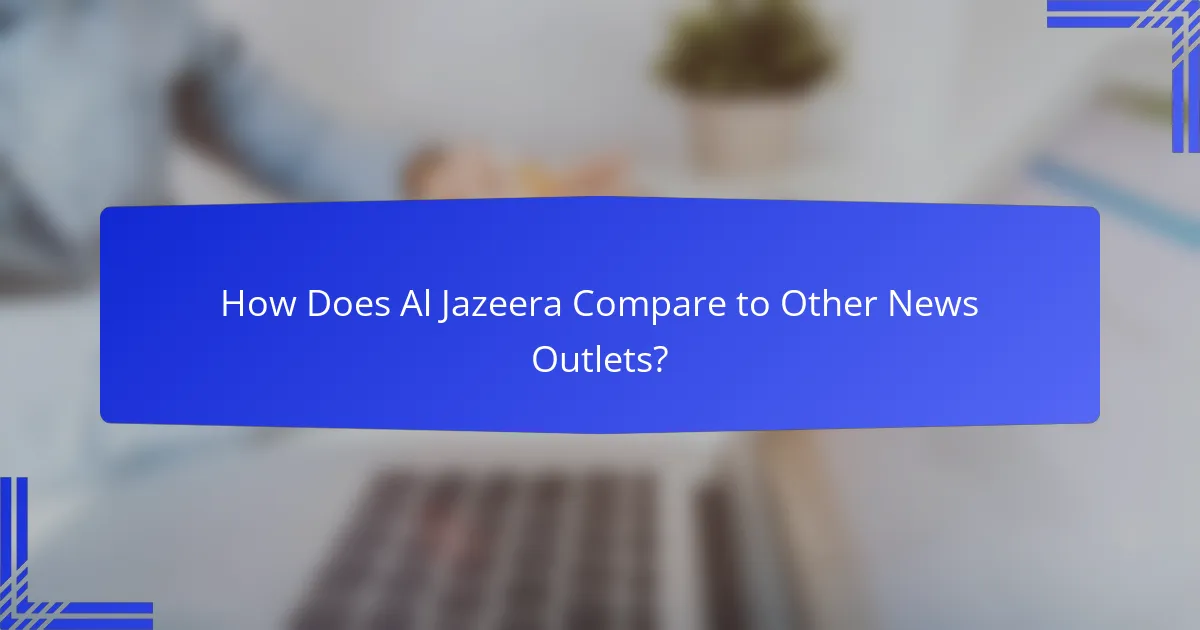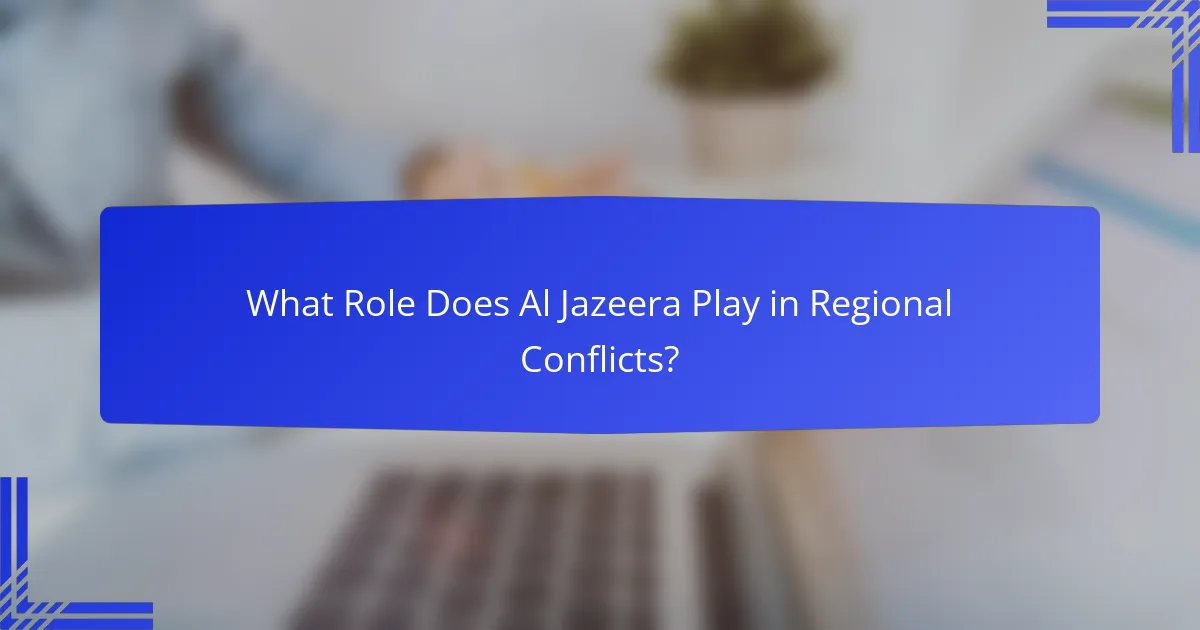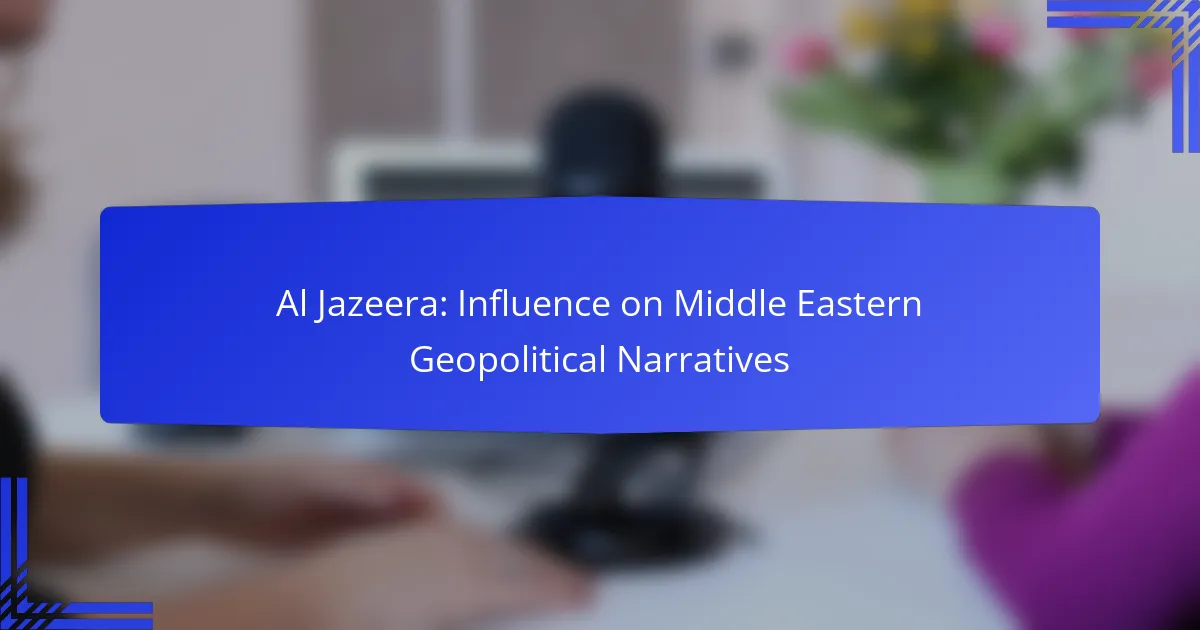Al Jazeera plays a pivotal role in shaping Middle Eastern geopolitical narratives by amplifying diverse voices and perspectives through its comprehensive news coverage. By employing investigative journalism and local correspondents, it enhances its credibility and influences public discourse, both regionally and internationally. Its unique focus on in-depth coverage of local issues sets it apart from other news outlets, allowing it to significantly impact how events are perceived and discussed. For insights on media coverage of international conflicts, further exploration is encouraged.

How Does Al Jazeera Shape Middle Eastern Geopolitical Narratives?
Al Jazeera significantly influences Middle Eastern geopolitical narratives by providing a platform that amplifies diverse voices and perspectives. Its coverage often shapes public discourse and impacts how regional events are perceived both locally and internationally.
Influence on public opinion
Al Jazeera plays a crucial role in shaping public opinion across the Middle East by offering alternative viewpoints that challenge mainstream narratives. Its reporting often resonates with audiences who feel marginalized by state-controlled media, fostering a sense of empowerment and engagement.
The network’s extensive reach, particularly through digital platforms, allows it to engage millions of viewers, making it a key player in influencing societal attitudes and political sentiments. This influence can lead to increased public activism and shifts in political landscapes.
Framing of regional conflicts
Al Jazeera’s framing of regional conflicts often highlights the humanitarian aspects and the voices of those affected, rather than solely focusing on political leaders or military actions. This approach can shift the narrative from one of mere geopolitics to a more human-centered perspective.
For instance, during conflicts in Syria and Yemen, Al Jazeera has emphasized civilian suffering and the impact of war on daily life, which can alter how audiences perceive these crises and the responsibilities of international actors.
Promotion of specific narratives
The network promotes specific narratives that align with its editorial stance, often advocating for democratic reforms and human rights. By emphasizing issues such as freedom of expression and social justice, Al Jazeera positions itself as a champion of progressive change in the region.
However, this promotion can lead to accusations of bias, particularly from governments that feel threatened by its coverage. Understanding this dynamic is essential for viewers to critically assess the information presented and its potential implications on regional politics.

What Are Al Jazeera’s Key Reporting Strategies?
Al Jazeera employs several key reporting strategies that enhance its influence on Middle Eastern geopolitical narratives. These strategies include investigative journalism, the use of local correspondents, and multilingual broadcasting, all of which contribute to its comprehensive news coverage and credibility.
Investigative journalism
Al Jazeera is known for its commitment to investigative journalism, often uncovering stories that challenge prevailing narratives. This approach involves in-depth research, fact-checking, and sourcing information from various stakeholders, which helps to reveal hidden truths and hold power to account.
For instance, Al Jazeera has produced extensive reports on corruption, human rights abuses, and political scandals across the Middle East. By focusing on these critical issues, the network not only informs the public but also sparks discussions that can lead to social change.
Use of local correspondents
The network relies heavily on local correspondents who provide firsthand accounts and insights into regional events. These journalists often have deep cultural and contextual knowledge, which allows them to report more accurately and sensitively on complex issues.
By utilizing local voices, Al Jazeera can cover stories that might be overlooked by other international media outlets. This strategy not only enhances the authenticity of their reporting but also builds trust with local audiences.
Multilingual broadcasting
Al Jazeera broadcasts in multiple languages, including Arabic, English, French, and Spanish, which broadens its reach and impact. This multilingual approach allows the network to cater to diverse audiences and present different perspectives on the same issues.
By providing content in various languages, Al Jazeera ensures that critical news reaches a wider demographic, facilitating a more inclusive dialogue on geopolitical matters. This strategy is particularly effective in regions with significant linguistic diversity, such as the Middle East and North Africa.

How Does Al Jazeera Compare to Other News Outlets?
Al Jazeera stands out among news outlets for its unique perspective on Middle Eastern issues, often providing in-depth coverage that contrasts with other networks. Its focus on regional narratives and local voices gives it a distinct edge in shaping public opinion and geopolitical discourse.
Comparison with BBC Arabic
BBC Arabic is known for its balanced reporting and adherence to journalistic standards, often presenting a more neutral tone compared to Al Jazeera. While both outlets cover similar stories, Al Jazeera tends to emphasize the voices of marginalized communities, which can lead to a more emotionally charged narrative.
In terms of audience reach, BBC Arabic has a significant following in the Arab world, but Al Jazeera often garners higher viewership during major regional events due to its extensive on-the-ground reporting. This difference in approach can influence how stories are perceived by the public.
Comparison with Al Arabiya
Al Arabiya, a Saudi-owned network, often aligns with the political stance of the Gulf Cooperation Council, which contrasts sharply with Al Jazeera’s more independent editorial line. This alignment can lead to a focus on different aspects of the same news stories, with Al Arabiya prioritizing narratives that support its regional allies.
Viewership demographics also differ; Al Arabiya appeals more to audiences favoring conservative viewpoints, while Al Jazeera attracts those seeking diverse perspectives. This divergence can affect how geopolitical events are framed and understood by their respective audiences.
Comparison with RT Arabic
RT Arabic, funded by the Russian government, presents a perspective that often challenges Western narratives, similar to Al Jazeera’s critique of Western policies in the Middle East. However, RT’s coverage may lean more towards promoting Russian interests, which can color its reporting on regional conflicts.
Both networks utilize strong visual storytelling, but Al Jazeera’s focus on humanitarian issues and local voices tends to resonate more deeply with audiences in the Arab world. This difference can significantly impact public perception and understanding of geopolitical dynamics in the region.

What Role Does Al Jazeera Play in Regional Conflicts?
Al Jazeera plays a significant role in shaping narratives around regional conflicts by providing extensive coverage and analysis that often challenges mainstream perspectives. Its reporting influences public opinion and political discourse in the Middle East, making it a critical player in geopolitical dynamics.
Coverage of the Syrian Civil War
Al Jazeera’s coverage of the Syrian Civil War has been extensive, focusing on the humanitarian crisis and the political complexities involved. The network has reported on the experiences of civilians, highlighting the impact of the conflict on daily life and the challenges faced by refugees. This approach has helped to raise international awareness and foster discussions about intervention and aid.
The channel often features on-the-ground reporting, which provides viewers with real-time updates and personal stories from those affected. This direct engagement with the conflict allows Al Jazeera to present a narrative that emphasizes the human cost of war, contrasting with more strategic or military-focused reporting from other outlets.
Reporting on the Israeli-Palestinian Conflict
In the Israeli-Palestinian conflict, Al Jazeera is known for its critical stance towards Israeli policies and its advocacy for Palestinian rights. The network frequently covers protests, military actions, and political developments, aiming to provide a voice to those who are often marginalized in mainstream media narratives. This focus has made it a key source for understanding the complexities of the ongoing conflict.
Al Jazeera’s reporting often includes perspectives from Palestinian leaders, activists, and ordinary citizens, which helps to humanize the conflict and highlight the socio-political issues at play. This approach can sometimes lead to accusations of bias, but it also fosters a deeper understanding of the historical and cultural contexts that shape the conflict.
Impact on Gulf Cooperation Council tensions
Al Jazeera’s influence extends to the tensions within the Gulf Cooperation Council (GCC), particularly during diplomatic crises. The network’s coverage can exacerbate divisions by highlighting differing viewpoints among member states, especially during conflicts like the Qatar diplomatic crisis that began in 2017. Its reporting often reflects Qatar’s perspective, which can lead to increased scrutiny and criticism from its neighbors.
The channel’s role in shaping narratives around GCC tensions illustrates how media can impact regional politics. By providing a platform for dissenting voices and alternative viewpoints, Al Jazeera contributes to the ongoing discourse about governance, sovereignty, and regional alliances, influencing both public opinion and policy decisions across the Gulf states.

What Are the Challenges Faced by Al Jazeera?
Al Jazeera faces several significant challenges that impact its operations and influence in the Middle East. These include government censorship, accusations of bias, and issues related to financial sustainability, all of which shape its ability to report freely and maintain credibility.
Government censorship
Government censorship poses a major obstacle for Al Jazeera, particularly in countries where media is tightly controlled. Authorities may restrict coverage of sensitive topics, leading to self-censorship or the omission of critical information. For instance, in nations like Egypt and Saudi Arabia, Al Jazeera has faced bans and restrictions that limit its reporting capabilities.
Accusations of bias
Al Jazeera has been frequently accused of bias, particularly in its coverage of regional conflicts and political issues. Critics argue that its reporting often reflects the interests of its Qatari ownership, which can undermine its credibility. This perception can alienate certain audiences and make it difficult for the network to maintain a neutral stance in contentious situations.
Financial sustainability issues
Financial sustainability is a growing concern for Al Jazeera, especially as media consumption shifts and advertising revenues fluctuate. The network relies heavily on funding from the Qatari government, which raises questions about its independence. As competition increases from digital platforms, Al Jazeera must explore diverse revenue streams to ensure its long-term viability and editorial freedom.

How Is Al Jazeera Adapting to Digital Media Trends?
Al Jazeera is evolving its approach to digital media by enhancing its online presence and leveraging social media to reach broader audiences. This adaptation focuses on creating engaging content that resonates with viewers in a rapidly changing media landscape.
Expansion of online content
Al Jazeera has significantly increased its online content offerings, providing a diverse range of articles, videos, and multimedia features. This expansion allows the network to cater to various audience preferences, from in-depth analyses to quick news updates.
The network has also embraced innovative storytelling techniques, such as interactive graphics and immersive video experiences, to engage users more effectively. By utilizing these formats, Al Jazeera aims to enhance user experience and retention on its digital platforms.
Engagement on social media platforms
Social media engagement is a crucial part of Al Jazeera’s digital strategy, enabling the network to connect with audiences in real-time. Platforms like Twitter, Facebook, and Instagram are used to share breaking news, promote original content, and foster discussions around current events.
Al Jazeera employs targeted campaigns and hashtags to increase visibility and encourage audience participation. This approach not only amplifies their reach but also helps in building a community of engaged viewers who contribute to the conversation around Middle Eastern geopolitical narratives.
